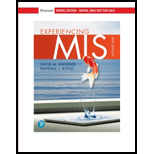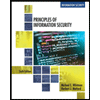
a)
Explanation of Solution
Kant’s categorical imperative:
The Kant’s categorical imperative is desired by the philosopher “Immanuel Kant” and he defined as that an “imperative” is a something that a person have to do.
For example, suppose a person wants to stop for being a thirsty then he has to drink, so in that ways we can says it is an “imperative”. And this will also know as the categorical /direct imperative.
- Kant’s categorical imperative states that one should behave in such a way that one would want the behavior to be a universal law.
- Cheating the customers is not ethical behavior, which is if all the company tries to deceive their customer then there won’t exists any honesty.
- Convincing their customers by making communication of real people with the bots is unethical. People are not aware that only bots were used to interact with them.
Therefore, according to Kant’s categorical imperative it is unethical to use bots to communicate with the customers.
b)
Explanation of Solution
Utilitarianism perspective:
Utilitarianism is nothing but a moral theory that states that the greatest act is the one that increases utility.
- According to utilitarian perspective, using bots on dating site is not ethical as it brings benefits only to the company.
- Customers are harmed financially, because they pay for the service provided by the company.
- The company is trying to cheat the customers by using automated bots instead of real people.
- They also demolish the time of people who spent in chatting with the bots.
Therefore, according to utilitarian perspective, it is unethical to use bots to communicate with the customers.
Want to see more full solutions like this?
Chapter 3 Solutions
Experiencing MIS
- Need help answering this question with a flowchart!arrow_forwardHW: a sewer carry flow = 600 l/s at 34 full at max WWF and 150 l/s at min DWF. Determine the diameter and minimum slope. Then get velocity and depth of sewage flow at max WWF and DWF. Use Vmin = 0.6m/s.arrow_forwardGeneral accountingarrow_forward
- JOB UPDATE Apply on- VinkJobs.com @ OR Search "Vinkjobs.com" on Google COMPANY JOB PROFILE JOB LOCATION INTELLIFLO APPLICATION DEVELOPER MULTIPLE CITIES GLOBAL LOGIC SOFTWARE ENGINEER/SDET DELHI NCR SWIGGY SOFTWARE DEVELOPMENT BENGALURU AVALARA SOFTWARE ENGINEER (WFH) MULTIPLE CITIES LENSKART FULL STACK DEVELOPER MULTIPLE CITIES ACCENTURE MEDPACE IT CUST SERVICE SOFTWARE ENGINEER MUMBAI MUMBAI GENPACT BUSINESS ANALYST DELHI NCR WELOCALIZE WORK FROM HOME MULTIPLE CITIES NTT DATA BPO ASSOCIATE DELHI NCRarrow_forward+is+how+many+tree+in+ipl&rlz=1C1GCEA_enIN1122IN1122&oq=1+dot+ball+is+how+many+tree+in Google 1 dot ball is how many tree in ipl All Images News Videos Short videos Shopping Web More 500 trees 4) हिन्दी में In English The step was a part of the Board of Control for Cricket in India's green initiative. The BCCI, having partnered with the Tata Group, has promised to plant as many as 500 trees for every dot ball bowled in the Indian Premier League. 25 Mar 2025 Sportstar https://sportstar.thehindu.com > Cricket IPL IPL News IPL 2025: Why are green tree symbols showing up for every ... A Translate to fo-d About featured snippets . Feedback Toolsarrow_forwardPastner Brands is a calendar-year firm with operations in several countries. As part of its executive compensation plan, at January 1, 2024, the company issued 480,000 executive stock options permitting executives to buy 480,000 shares of Pastner stock for $38 per share. One-fourth of the options vest in each of the next four years beginning at December 31, 2024 (graded vesting). Pastner elects to separate the total award into four groups (or tranches) according to the year in which they vest and measures the compensation cost for each vesting date as a separate award. The fair value of each tranche is estimated at January 1, 2024, as follows: Vesting Date Amount Fair Value Vesting per Option: December 31, 2024 25% $ 3.90 December 31, 2025 25% $ 4.40 25% $ 4.90 25% $ 5.40 December 31, 2026 December 31, 2027 Required: 1. Determine the compensation expense related to the options to be recorded each year 2024-2027, assuming Pastner allocates the compensation cost for each of the four…arrow_forward
- What is one benefit with regards to time complexity of using a Doubly Linked List as opposed to an Array when implementing a Deque?arrow_forwardWhat is one benefit with regards to space complexity of using a Doubly Linked List as opposed to an Array when implementing a Deque?arrow_forwardWhich basic data structure (Doubly Linked List, Singly Linked List, Array) would you use to implement a Stack? Why?arrow_forward
 Fundamentals of Information SystemsComputer ScienceISBN:9781337097536Author:Ralph Stair, George ReynoldsPublisher:Cengage Learning
Fundamentals of Information SystemsComputer ScienceISBN:9781337097536Author:Ralph Stair, George ReynoldsPublisher:Cengage Learning Principles of Information Systems (MindTap Course...Computer ScienceISBN:9781305971776Author:Ralph Stair, George ReynoldsPublisher:Cengage Learning
Principles of Information Systems (MindTap Course...Computer ScienceISBN:9781305971776Author:Ralph Stair, George ReynoldsPublisher:Cengage Learning Management Of Information SecurityComputer ScienceISBN:9781337405713Author:WHITMAN, Michael.Publisher:Cengage Learning,
Management Of Information SecurityComputer ScienceISBN:9781337405713Author:WHITMAN, Michael.Publisher:Cengage Learning, Principles of Information Systems (MindTap Course...Computer ScienceISBN:9781285867168Author:Ralph Stair, George ReynoldsPublisher:Cengage Learning
Principles of Information Systems (MindTap Course...Computer ScienceISBN:9781285867168Author:Ralph Stair, George ReynoldsPublisher:Cengage Learning Fundamentals of Information SystemsComputer ScienceISBN:9781305082168Author:Ralph Stair, George ReynoldsPublisher:Cengage Learning
Fundamentals of Information SystemsComputer ScienceISBN:9781305082168Author:Ralph Stair, George ReynoldsPublisher:Cengage Learning Principles of Information Security (MindTap Cours...Computer ScienceISBN:9781337102063Author:Michael E. Whitman, Herbert J. MattordPublisher:Cengage Learning
Principles of Information Security (MindTap Cours...Computer ScienceISBN:9781337102063Author:Michael E. Whitman, Herbert J. MattordPublisher:Cengage Learning





